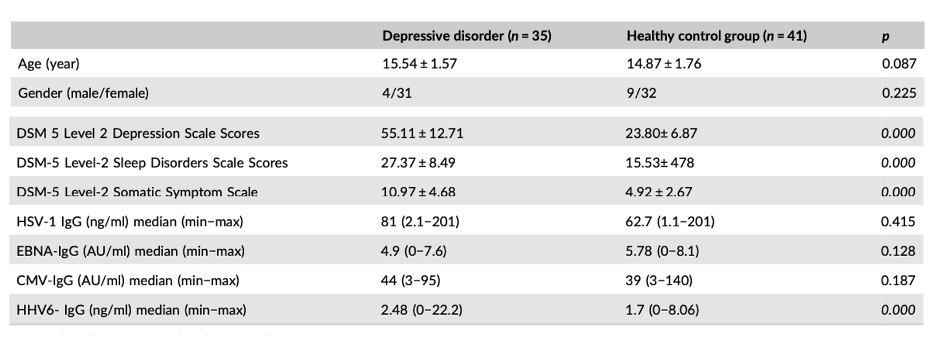In the past decade, multiple studies have reported that: 1) neurotropic herpesviruses that establish latency in the brain may produce a state of chronic, low-grade neuroinflammation; 2) neuroinflammation likely plays an important role in depression and neurodegenerative diseases. Past studies have found conflicting evidence about a possible link between depression and infection with herpes simplex type 1 (HSV1) and cytomegalovirus (CMV). Most of the studies have been in adults. However, although depression is uncommonly diagnosed in young children, it is seen in 4-12% of teenagers—making it a substantial problem. Studies are needed to assess whether infection with neurotropic viruses, like the herpesviruses, may be one trigger of depression, particularly in teenagers and adults.
Investigators at Manisa Cerlal Bayar University in Turkey conducted a case-control study to explore the possible relationship between several herpesviruses and childhood depression. 36 children with diagnosed depression were compared to 41 age- and gender-matched non-depressed children. Levels on one occasion of anti-HSV1-IgG, anti-CMV-IgG, anti-EBNA (Epstein-Barr virus), and anti-HHV6-IgG were measured. An ELISA kit from Shanhai Sunred Biological Technology, China was used for HHV-6 testing.

A comparison of herpesvirus antibody levels in patients and controls. Source: Bayturan 2022, Journal of Medical Virology.
There were no statistically significant differences in seropositivity to HSV1, CMV, EBV, comparing the children with and without depression. However, levels of anti-HHV6-IgG were significantly higher (p=0.0001) in children with depression, particularly those with thoughts of suicide.
One prior study has linked HHV-6 to major depression and bipolar disorder, lending some plausibility to this report. However, serological studies are an indirect way of assessing possible infection of the brain. Perhaps autopsy studies of brain tissue from depressed children who die (from suicide or other causes), and from non-depressed controls that also die from other causes, would be instructive.
Read the full article: Bayturan 2022

